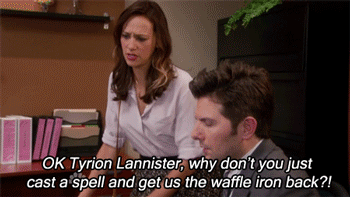Wednesday, May 1, 2013
More Soap, More Opera
I've dedicated a lot of time to thinking about whether or not fictional characters act in a realistic way, probably more than the time that I've dedicated to thinking about whether or not real people act in a realistic way (if my Econ classes have taught me anything, it's that they should, but they don't). I've excluded things that blatantly go over the top to entertain-- and do it well. Thomas Pynchon is my favorite writer, but most of his characters are devices to foster his intricate worlds and themes. What I want to do here is look at complex characters and their motives, and see how they function: whether they seem natural or fabricated for drama.
I've read a few articles on how Game of Thrones (there will be spoilers here, so watch out) has elements of a soap opera, and I wondered about what that meant. Obviously, there's the sex, the intrigue, the unexpected. Lots of TV shows have that, and they work with varied success. Why would I single Game of Thrones out? Its setting isn't anything we're familiar with in the real world-- I, for one, have never seen dragons hatch out of stone eggs because a young widow tried to burn herself with them. I picked it because its characters are complex. Nothing is black and white in Westeros. Throughout the series, characters who started out as villains become tragic heroes, the heroes get killed, and people's passions generally screw them over. While there are characters that are easier to root for than others, everyone can have dubious motives at times, and for the most part, they make sense.
The framework of Game of Thrones provides for really interesting conflicts between these characters. One of its main themes is who deserves to rule-- (once again, spoilers. Do not spoil it for yourself) Stannis, the true heir, Renly, not technically the heir, but who's visibly seen to be a better ruler? Jeffery, as he's already there? Does Robb have the right to break away? And does Balon have the right to be a brutal asshole (I really, really do not like the Greyjoys)? And then there's Dany, a remnant of the true ruling house of Westros. Along with that, there's issues of family, religion, warfare, economy, politics, and trust.
So where the hell is there room for a soap opera?
Well, first off (dude, I'm not going to tell you again. SPOILERS) a young child gets paralyzed because an incestuous knight throws him off a tower to hide his illicit relationship with his sister. How does this plot-line work? Well, to start off, it kicks off the events in all of ASOIAF. What if Bran hadn't gone climbing that day? Ned would've still been the Hand, Jon Arryn's death wouldn't have looked as suspicious (the note from his widow Lisa notwithstanding) and Cat wouldn't have taken as much time to evaluate what exactly had happened, considering no assassin would have tried to kill her son. The argument could be made that under the circumstances, Jon would not have joined the Night's Watch. Cat would not have taken Tyrion hostage, and the war between the Lannisters and the Tullys wouldn't have happened.
See what extreme behaviors do to a world?
Had Cersei and Jamie not been discovered (this is a big enough jump, so I won't consider what would have happened if they never had slept together), Ned would have investigated Jon's death. He would have discovered Robert's bastards, and that they all have black hair. But where to then? Without the blonde hair found in the tower, how long would it have taken him to realize that Jamie and Cersei were more than just brother and sister? That's what soap opera elements do in an otherwise realistic world: they're catalysts. They speed up things in ways that are entertaining and realistic.
These things happen in the real world too-- people act irrationally to gain what they think is in their best interest. The world of Westros is wide and sprawling, and focusing in on the Faceless Men or the Dothraki, as interesting as that may be, isn't going to tell as good as a story as the War of the Seven Kings. As long as we realize that these people behave consistent with their personality and motives, these plot catalysts are fine.
And for those who just don't understand:
... she actually does make a very good point.
Subscribe to:
Post Comments (Atom)


No comments:
Post a Comment